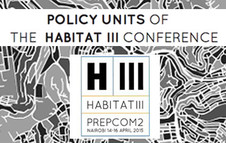
UCLG has been invited to co-lead Policy Unit Four on Urban Governance, Capacity and Institutional Development with the London School of Economics as part of the preparations for the Third United Nations Conference on Housing and Sustainable Urban Development, Habitat III, to be held in Quito, Ecuador, in October 2016. UCLG will carry out this role in close coordination with the Global Taskforce of Local and Regional Governments.
The invitation to UCLG to co-lead one of the ten Habitat III policy units is a strong sign of the recognition of the role of local government networks in the Habitat III process.
The policy units’ goals are to bring together high-level expertise to explore state-of-the-art research and analysis on each thematic area, identify good practices and lessons learned, and develop policy recommendations in each area to feed into the New Urban Agenda, the 20-year global agenda on sustainable urban development that will come out of the Habitat III conference.
Each policy unit is made up of 20 experts from different world regions that represent different constituencies, who were nominated by Member States and stakeholders and appointed by the Habitat III Secretary General. Policy Unit Four includes a range of prestigious academics and policy-makers. The local and regional governments’ networks have made proposals of experts through the GTF which have mostly been retained.
The first draft the policy papers will be completed by the end of December 2015 and the deadline for the final drafts is February 28, 2016.
It is expected that the Global Taskforce will play a facilitating role in the briefing of the different experts, aiming to provide a local perspective to each of the policy areas. A briefing and planning meeting of the Global Taskforce is planned for early November.
UCLG, the Global Taskforce and the LSE will coordinate the inputs of experts in urban governance for the policy paper of Policy Unit Four, which will take the Habitat III issue paper on urban governance, published earlier this year, as its starting point.











